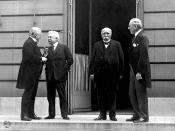'The Treaty of Versailles was unfair'
The treaty of Versailles was a condition of terms regarding peace that was presented to Germany by the Allies in 1919. Three reasons why the treaty was unfair was that Germany was forced to take all the blame for the war, Germany lost 6 million people and 13% of her territory and Germany was forced to pay an outstanding amount in reparations.
In November 1918 to June 1919, the representatives of the victorious nations (Great Britain, France, Belgium, Italy, USA, Rumania, Serbia, Greece, Montenegro, Portugal and Japan) sat in judgement on the vanquished (Germany, Austria-Hungary, Bulgaria and Turkey) at the Peace Conference of Paris.
The peace conference was dominated by the conflicting aims of three statesmen:
David Lloyd George the Prime Minister of the United Kingdom, Lloyd George could see the economic difficulties in store for Europe if Germany was treated too harshly, but he had recently won an election on his promise to "make Germany pay."
Therefore he pursued a hard line with the vanquished. Georges Clemenceau the Premier of France, saw the conference as a chance for revenge on Germany, financial restitution by Germany and perhaps the taking of measures to prevent Germany from ever again threatening the security of France and Woodrow Wilson the President of the USA, had earlier enunciated his fourteen points and his general principles for "a just peace". Germany had accepted the armistice with the fourteen points in mind.
Wilson believed that the treaty should not be too harsh on Germany. He said that if the treaty punished Germany too greatly it might one day recover and want revenge.
Having rejected much of Wilson's idealism, France and the Britain then proceeded to impose a Carthaginian peace on the defeated.
One of the reasons why the treaty was...


